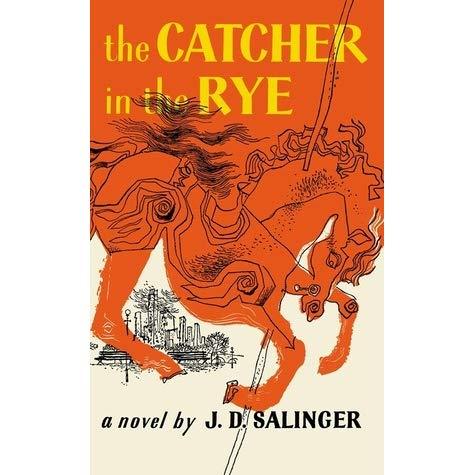#this is an extraordinary development in our parasocial relationship
Explore tagged Tumblr posts
Text
dan and phil don't know what they've gotten themselves into by acknowledging the tumblr posts we put in the phlit. it's like we have discovered a new technology to communicate with them like we've domesticated the carrier-pidgeon or something. australia and the uk take note
#this is an extraordinary development in our parasocial relationship#dnp#dan and phil#phan#daniel howell#phil lester
519 notes
·
View notes
Text
September 19, 2019: Catcher in the Rye
The effects of media messages were discussed this week, as well as an article regarding the four processes of audience involvement with media personae: Transportation, parasocial interaction, identification, and worship.
Have you ever read a book or watched a movie and just got completely lost in it? According to this article, a “highly transported individual is cognitively and emotionally involved in the story” (Brown, 2013, p.4). In high school it was mandatory to read Catcher in the Rye. I immediately fell in love with the story, and the main character, Holden. In retrospect, it was most likely my teenage angst that made fall in love with the concept of Holden Caulfield, but I just felt so connected to him. Every time I had a thought, I would ask myself, “What would Holden do?” It was like he understood my moods, and how I felt about people. The ambiguity in so many of his thoughts had me hooked. It was like every time I would read the book, I would learn something new about him. He was a puzzle I tried so hard to solve, and kept wishing to learn more about. It was strange because I was aware he wasn’t real, but I was so captivated by the way that J.D Salinger crafted him, that I kept ignoring the fact that he was nothing but a character.

The narrative and characters in Catcher in the Rye transported me into a whole other world, but this example also relates to identification, and worship. This is extremely embarrassing to admit, but it got to the point where I would put him, a fictional character, on a pedestal and compare him to every other guy I knew. I wished to meet a boy like him, to be able to talk to someone like him, and figure someone out the same way I endlessly tried to figure Holden out. It felt like no one would be able to interest me in the same way. Through putting him on a pedestal and finding so much insight in his thoughts, he almost became a God-like figure to me. His ideas and emotions meant so much to me, and I thought they were so extraordinary. When I went to New York City in grade 11, the majority of my excitement was caused by the fact that I was going to visit some of the places he frequented in the novel. I quite literally transported myself to attempt to live his life. In fact, I even took a picture of the place in Central Park that he always went to, posted it on Instagram and captioned it, “Holden spent a lot of time here.” Through finding identification through his thoughts and feelings, I began to worship him and become transported to his world. Involvement was also evident in this example as there were, unfortunately enough, “illusions of intimacy” created (Brown, 2013, p.3).
Many Youtubers have large communities of subscribers that worship their every move. Very often, large Youtubers will give their fans a special name that they are collectively referred to, and speak to their audience as if they are all individual people that are special to them. Dan and Phil call their audience their “phandom,” meanwhile PewDiePie refers to his as his “Bro Army.” Smaller Youtubers also do this, and usually have a greater chance of developing a more genuine, personal relationship with their subscribers. They may have livestreams to interact with subscribers, give “shoutouts” to their viewers to express their outmost gratitude and love for their viewers. This is known as a parasocial relationship: “a pseudo-relationship that results from a false sense of intimacy created during media consumption” (Brown, 2013, p.5). The “love” and “appreciation” these Youtube personalities convey only create false intimacies between them and their subscribers.
The People’s Choice attempted to answer the question “to what extent did the radio and newspapers shape voters’ choice in a presidential election?” (Sullivan, 2013, p.42). To conclude, very few actually changed their minds from the start of the campaign to the end. According to the study, news exposure only reinforced their opinions, rather than change them. I found this interesting as I believe it still rings true for decided, passionate voters. However, I believe the 2019 election is significant in the fact that there are a large amount of undecided voters who aren’t really looking for reinforcement, but to be convinced. These undecided, mainly young voters, are looking to opinion leaders for insight. Many political clubs on campus have been attempting to make themselves appear as opinion leaders during the election campaign. The club I am in constantly gets asked questions from undecided students who are unsure of who to vote for. We inform them on our candidate’s platform, and other party platforms as well. A club we partnered with on a Townhall event with local cross-party candidates, First Vote, attempts to bring non-partisan voting information and insight into each party platform to students. Similarly, as mentioned in my first entry, 6ixbuzz also attempts to act as a platform for many opinion leaders to spread their political opinions to masses of followers.
References
Brown, W. J. (2015). Examining Four Processes of Audience Involvement With Media Personae
Sullivan, J. L. (2013). Media audiences: effects, users, institutions, and power.Thousand Oaks, CA: SAGE Publications, Inc.
0 notes